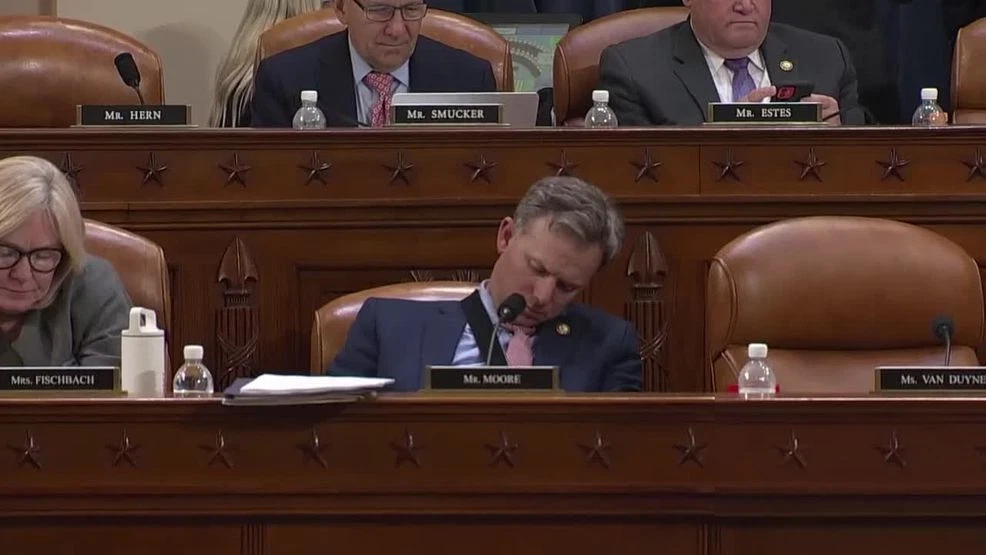In an age where every blink is broadcast and every pause is plastered across screens, one moment caught on camera is sparking national curiosity—and a whole lot of controversy. Once again, Congressman Moore falls asleep, this time during a live-streamed congressional debate that had the internet ablaze within minutes. But was it a simple lapse in energy or a deeper reflection of political fatigue, accountability, and the high-stakes burden of public office?
The phrase “Congressman Moore falls asleep” isn’t just a trending search; it’s a narrative now woven into the fabric of public perception. As citizens and voters, we’re compelled to ask: what does it mean when our elected officials appear disengaged during key moments?
Let’s unpack the viral footage, dig into the timeline, and hear from those close to the fire—including those calling for answers.
The Moment: What the Camera Captured
The video was posted on Tuesday afternoon and documented the situation when a vital decision concerning national security measures was being taken in a heated debate, Congressman Moore went to sleep. His eyelids started fluttering, his head jerked and within seconds he was evidently asleep and at least 45 seconds had passed and cameras and the critics were already in lock-down mode.
This wasn’t the first time Congressman Moore falls asleep has hit the headlines. A similar instance occurred during a budget committee meeting in late 2023, though aides then insisted he was “resting his eyes.” This time, there’s little ambiguity.
One thing is obvious, though, as the clip is shared on all the major platforms, across satirical tik tok accounts and more serious political commentaries are posted, it got under the skin.
Public Backlash and Political Fallout
It did not come as a surprise that the responses were fast and furious. Voters went to social media with such hashtags as #MooreNapGate, and late-night television hosts made a field day out of it. Reflectively, satirists would note that it is a dire portrayal of a drying out leadership or languid leadership given the fact that the Congressman Moore is observed to have slept when Congress is busy.The supporters, in their turn, claim long hours, illnesses, and pressures the work in the services of the nation cannot stand.
Key reactions included:
- Senator Alvarez, who was mid-speech during the incident, told reporters: “This isn’t about embarrassment. It’s about accountability.”
- Constitution Watchdog, a political advocacy group, released a formal letter demanding an inquiry into Moore’s fitness to serve.
When spending time in the House, Congressman Moore slips and sleeps, because of tiredness or more seriously his health condition, those images and appearances depict not only that one is uncomfortable but imply a lack of focus, engagement, and adherence to the mandate of the people.
Humanizing the Moment: Are We Too Quick to Judge?
Let’s get real: we’ve all nodded off during long meetings, dreary lectures, or marathon Zoom calls. And while yes, Congressman Moore falls asleep on the job is undeniably newsworthy, it’s also deeply human.
One former congressional aide shared:
“You don’t see the 18-hour days, the briefings at dawn, the emotional toll. It’s not an excuse—but it’s context.”
This episode isn’t just a meme-worthy moment. It’s a mirror. Are we creating an environment where leaders can’t show fatigue without being vilified? Or is the standard of vigilance in public office one that must never waver?
A Pattern or an Anomaly?
What makes this instance so critical is the pattern it may suggest. This isn’t an isolated yawn. If we’re seeing headlines where Congressman Moore falls asleep multiple times, the conversation moves from ridicule to serious inquiry.
Is this about age, burnout, health? Political insiders are already speculating. Medical professionals haven’t confirmed anything specific, but sleep disorders in high-pressure roles aren’t unheard of. According to the National Sleep Foundation, over 30% of professionals in high-stress roles report chronic exhaustion.
And in politics? That number is likely even higher.
Media’s Role: Fuel or Flame?
The other aspect of this includes the side of the media responsibility. What then disappears into the nuance of the viral sound bite is the deeper dialogue of Congressman Moore falling asleep.Reputable outlets like The Washington Post and The Guardian have now begun to explore this, citing the potential dangers of meme-driven political criticism overshadowing the issues being debated—like national security, education, or infrastructure—during which these lapses occur.
What Happens Next?
An official declaration by the House Ethics Committee has not been forthcoming but there are allegations that a closed-door meeting was held.If further incidents occur—if we’re back here in a few months with the same keyword, Congressman Moore falls asleep, splashed across headlines—the pressure to act may be insurmountable.
But even if no formal steps are taken, one thing has changed: public scrutiny is at an all-time high.
Voters, donors, and even Moore’s own party allies are watching.
So, What Do We Really Expect from Our Leaders?
This moment invites a broader conversation: Should we expect unwavering alertness from our representatives at all times? Or do we offer grace when human limits emerge? It is not really a problem that Congressman Moore is sleepy. It is what represents a possible disconnect between those who make the rules and the ones being ruled. These mistakes are like cracks in a period where the trust they have in political establishments has already been weakened.
Conclusion
Whether it’s a moment of rest or a red flag, Congressman Moore falling asleep has become a phrase loaded with meaning. It’s about leadership, accountability, and yes—humanity.
As voters and readers, we now hold more power than ever before. We decide whether these viral clips are punchlines or pressure points. We decide whether moments like these shape our future leaders or simply give us something to talk about for a few days.

